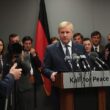Data released by the Federal Statistical Office reveals a significant proportion of young men slated for military conscription in Germany possess multiple citizenships, sparking debate and raising security concerns within the government. Approximately one-sixth of men eligible for the renewed military service obligation, set to begin in 2026, hold citizenship beyond Germany.
The census data, reflecting figures as of May 15, 2022, identified 340,859 German citizens born in 2008. Of these, 56,693 also hold other nationalities. Turkish citizenship is the most prevalent secondary nationality (14,463 cases), followed by Polish (4,141), Italian (3,857) and Russian (3,691). Significant numbers also hold citizenships of Serbia (1,888), Morocco (1,640) and Kazakhstan (1,620). Authorities acknowledge these figures likely exceed current data due to a 2024 reform of citizenship law, which has relaxed restrictions on multiple citizenship.
The impending reintroduction of conscription has prompted the defense ministry to implement a “supported loyalty examination” for potential recruits before their service begins. This process, intended to ascertain commitment to Germany’s fundamental democratic order, places significant scrutiny on individuals holding dual or multiple citizenships. “The responsible authority decides whether a person with multiple citizenships provides assurance of adherence to the fundamental democratic order as stipulated in the Basic Law” a ministry spokesperson stated, emphasizing the assessment of loyalty.
Experts are raising particularly urgent concerns surrounding individuals with German-Russian dual citizenship. Matthias Friehe, professor of law and economics at EBS University, characterized the 2024 citizenship reform as “incompatible with the Zeitenwende [a significant geopolitical shift]” due to its simplification of acquiring dual German-Russian nationality. He argues, “Loyalty to Germany’s democratic order is fundamentally incompatible with loyalty to the Putin regime.
The expansion of multiple citizenships is also generating concerns about increased bureaucratic complexity and potential security vulnerabilities. Ferdinand Weber, a specialist in citizenship law and visiting professor at the University of Bremen, notes that “the unlimited acceptance of multiple citizenship leads to new bureaucracy, as potential conflict situations are multiplied”. He warns of both risks to national security and potential loyalty conflicts should individuals be deployed by their second country of origin. Weber predicts that many will ultimately be deemed unsuitable for conscription due to these concerns. The implications for national security and the future of German conscription are expected to be a subject of ongoing political and legal debate.





